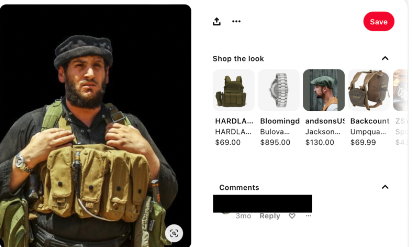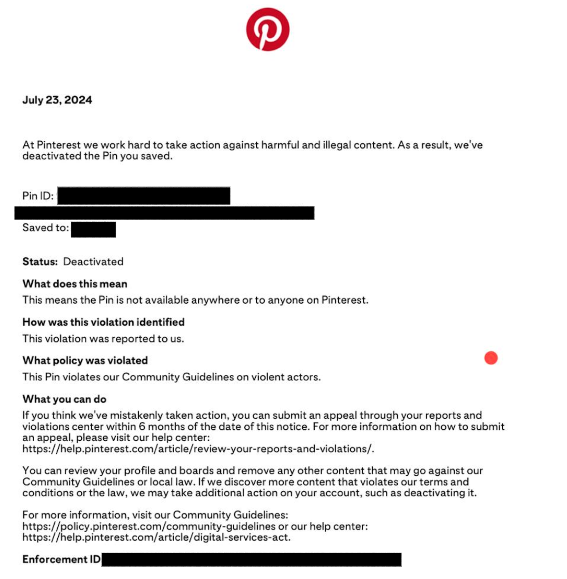Introduction
Insightful research has examined how Islamic State media and pro-Islamic State supporters navigate a wide array of social media apps, including, but not limited to, Telegram, Meta, and Twitter (now X), and TikTok. Studies also note larger behavioural patterns exhibited in pro-IS virtual spaces, such as how they evade content moderation efforts, form unofficial translation collectives, fundraise, exploit AI, and decentralise. However, less research focuses on more visual content-focused platforms like Pinterest and Instagram. In efforts to contribute toward understanding how pro-IS supporters operate on these types of apps, this Insight will specifically focus on pro-IS activities on Pinterest. It first provides an overview of Pinterest, followed by a walkthrough on the process of finding pro-IS content on the platform. The next section examines the types of content that pro-IS supporters share, how Pinterest’s algorithm helps pro-IS users curate their feeds and find other like-minded accounts, and content moderation strategies IS supporters use on the platform. The conclusion proposes why examining Pinterest and other apps that are not as commonly studied is important and provides a Pinterest-specific policy suggestion to stem the growth of propaganda.
About Pinterest
Pinterest describes itself as “a visual discover engine for finding ideas like recipes, home and style inspiration, and more. With billions of Pins [‘visual bookmarks that people use to save content they love’] on Pinterest, you’ll always find ideas to spark inspiration.” The platform allows users to save Pins to “boards” which can centre on a particular theme or aesthetic for example. After selecting an image, the platform suggests what it detects as similar images to help users further grow their Pinterest boards and collections.
The Search for IS Pinterest
A pro-IS account posting propaganda enhanced with generative AI initially brought me to Pinterest. This individual, pseudonymously referred to as IslamicState_Supporter uploaded their content on their Instagram and Meta accounts, but in case of being de-platformed, they stated in the comment sections that people could continue to follow their work on Pinterest. Pinterest also served another purpose: IslamicState_Supporter uploaded images with blurred IS flags on Instagram and Meta, but on Pinterest, they featured the original unblurred content. Their followers took note of this pattern and asked them to provide unblurred versions of the propaganda on Pinterest – in short, reinforcing a cross-platform propaganda dissemination strategy where other pro-IS supporters could access both modified and unmodified versions of these AI images. Although Pinterest served as a stable ‘home’ for IslamicState_Supporter’s work, their account has since been deleted numerous times, and the platform is no longer as viable of an option. According to an announcement IslamicState_Supporter made on another social media platform, they are currently taking a temporary absence, intending to return again.
While tracking IslamicState_Supporter’s AI content shifted away from Pinterest, the initial search led me to a much wider collection of pro-IS visuals and, more specifically, other AI-enhanced propaganda. I also found pro-IS Pins using keyword searches in English and Arabic. Notably, direct word searches in English such as “ISIS” and “Islamic State” resulted in a notice about it “violating our community guidelines” but applying other terms in both English and Arabic quickly circumvented this barrier (figure 1). It is important to state that this is not unique to Pinterest but instead reflects wider difficulties social media companies often encounter when attempting to restrict access to IS content – especially in other languages.

Figure 1: Notably, direct word searches in English such as “ISIS” and “Islamic State” resulted in a notice about it “violating our community guidelines.”
Exploring Pro-IS Pinterest
The following observations are drawn from pro-IS accounts that I have been able to monitor since January 2024. The “more to explore” suggestion featured below a pin acted as a key vector for identifying more IS content.
Content
Pro-IS supporters upload a wide array of content encompassing unofficial and official propaganda in various languages, clips from IS videos (including execution videos), supporter-created ‘artwork’ (including AI-enhanced content) with pro-IS themes, and memes. Although some users post text-heavy images, most prefer to share visuals with little to no text, reflecting a general adherence to Pinterest’s focus on visual content. Aside from the image-focused nature of the platform, pro-IS content on Pinterest does not appear to diverge greatly from what is shared on other social media spaces.
Algorithms
As previously mentioned, viewing one type of content leads to other similar pins, and as Pinterest states, viewed content, followed accounts, browsing history, and a user’s boards collectively curate one’s home feed. The platform also offers a “shop the look” feature, which can identify items in a photo and send users to sites where similar objects are sold. The objects themselves are not nefarious in and of themselves, but showing an individual how they can copy the ‘styles’ of people like Abu Muhammad Al Adnani or an IS executioner by suggesting links on where to purchase the “look” could be concerning (figure 2). Researchers have discussed the concept of “roleplaying extremist fantasies” within the context of video games, but the “shop the look” feature paired with images of Adnani and others may raise questions on if this could possibly contribute to a similar form of fantasising.

Figure 2: A “shop the look” example on an IS fighter.

Content Evasion Strategies
Like other platforms, pro-IS supporters on Pinterest employ the same tactics to avoid content moderation efforts. Examples include, but are not limited to, altering images, using emojis to cover militant groups’ symbols, breaking up text, or keeping accounts in private mode. More uniquely to Pinterest, pro-IS accounts attempting to keep a lower profile may post images unrelated to the Islamic State and sprinkle pro-IS content into the mix occasionally to reduce the risk of detection.
As demonstrated by the case of IslamicState_Supporter’s propaganda dissemination strategy, pro-IS accounts integrate Pinterest into their larger pro-IS social media space. These individuals may use Pinterest to ‘lie low’ when they face heat on other platforms, maintain back-up accounts, and feel emboldened to share more blatantly obvious IS content that might be flagged on other platforms. Content evasion also involves posting cross-platform links to other platforms in the comment sections of pins. It must be highlighted that the fact IS supporters frequently do not feel the need to blur images on Pinterest suggests that they feel Pinterest is, to a certain degree, a safe haven platform for their content.
Conclusion
The ability to remain versatile and adaptive constitutes an ongoing strength of pro-IS supporters’ social media and propagandising strategies. In order to remain updated on the full breadth of their activities, it is important to examine how they exploit various apps including spaces that are not as frequently studied such as Pinterest. Once IS supporters (and other extremists) find a gap, they quickly entrench themselves on the platform and test the boundaries to see how exploitable the space will be.
The following is a Pinterest-specific policy suggestion that could be helpful in stemming the proliferation of pro-IS content on the platform:
After IslamicState_Supporter’s accounts were repeatedly deleted, the ban also removed the original posts made by this individual. However, others who bookmarked these images before Pinterest banned IslamicState_Supporter effectively ensured the content would remain on the platform. For example, the following pin initially appeared under IslamicState_Supporter’s Pinterest account name, but because the user with the account name beginning with “L” saved the original, the content remains on the platform and now shows “L” as the poster (figure 3):

Figure 3: IS supporter poster.
This method allows pro-IS users to easily back up pins that violate Pinterest’s policies and ensure longevity of the content. That being said, Pinterest’s “deactivated” approach appears to fulfil the function of permanently removing content. During my exploration of IS Pins, I created a private board where I saved IS content, and for some of the Pins I bookmarked, the app sent me a notice that the Pin has since been “deactivated”. Deactivated means that “the Pin is not available anywhere or to anyone on Pinterest” (figure 4). Finding a way to expand this approach and quicken the detection time would negatively impact the flow of IS content. But as of now, and from my subjective observation of IS Pins, it seems like a drop in an ocean:

Figure 4: Pinterest deactivation notice.
Regarding content moderation, Moustafa Ayad, Executive Director at ISD Africa, The Middle East, and Asia, observes:
“What I see is an absolute failure to interrupt and moderate IS content in Arabic or any other language for that matter on the platform. There are very graphic videos from the group’s history and unofficial supporter outlets operating on the platform. Similary there are AI content producers that are experimenting with IS content. The algorithm similarly pushes out this content to my research account. I’ve been getting IS content from the platform to my email on a daily basis ever since I noted the fact that there are clear moderation failures on Pinterest.”
As content moderation efforts continue, it will be important to gain an intimate understanding of how pro-IS and others who violate platform policies operate on a granular level.
